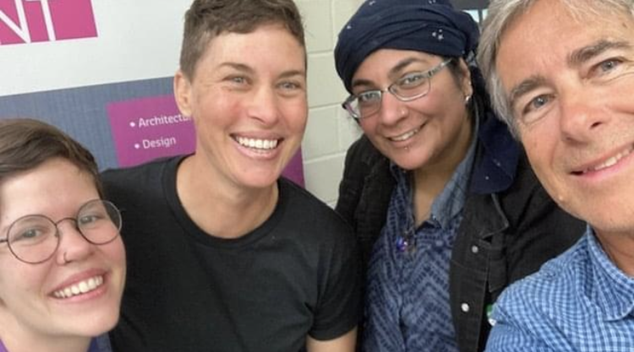
OPINION: Dante Boffa is a postgraduate student at Curtin University & Dr. Maddy Magladry is an academic in Curtin University’s School of Media, Creative Arts and Social Inquiry
Queer people engaging in conversation about queer issues is obviously important, but too often these discussions are academic, theoretical and inaccessible to people both in Perth and across the country. Talking about what being queer means, how queer people occupy space and the many intersections within the community often becomes the exclusive domain of the university academic.
With this problem in mind, Dr. Maddy Magladry – along with Dr. Deb Hunn and Dr. Bri McKenzie – created In Queer Minds, a podcast series that takes academic discussion and brings it into the everyday. Emerging from Curtin University’s Centre for Human Rights Education, the podcast series features guests ranging from academics to sexologists, and tackles topics like the role of allies in the queer community, the importance of interdisciplinary research and amplifying queer indigenous perspectives.
“We can no longer get away with talking about the queer community as one thing, so we wanted to focus on the intersections and diversity contained within the queer community,” Magladry says.
“We talked to professionals, advocates and academics from all over the queer community to understand how queer people occupy different spaces and represent voices from across the queer spectrum.”
As people recognize that the queer community is not a homogenous bloc, it becomes clear that there is some separation between academic and non-academic people within the community.
“Many people don’t have access to these conversations: either they require people to have a grip on queer theory and academic jargon, or they’re kept behind a paywall, where people might not know about it or have access to it.”
In Queer Minds is freely available and links the academic and the everyday to provide an entry point into these important discussions for both queer and non-queer people. It’s important to have these conversations at an academic level so that researchers and advocates can influence policy, but this risks excluding the same people who are supposed to be represented.
Inclusion, rather than exclusion, is a central theme of the podcast series, and Magladry emphasizes the importance of research that amplifies queer voices, rather than speaking for them. A crucial part of amplifying these voices is bringing them into the conversation, and In Queer Minds tackles topics like community and inclusion, indigenous perspectives and youth lived experience.
“We want to shed light on what queer means, how complex it is to be a queer person and how much variety and difference there is within the community.”
Professor Braden Hill and Mx Misty Farquhar are particularly enlightening in episode three when discussing inclusivity within the queer community, both locally and nationally. Mr Kai Schweizer and Mx Shoshana Rosenberg also explored ideas of queer experience and lived experience, with particular focus on young people and their involvement in these conversations.
Representing such a broad cross-section of the queer community wasn’t hard, Magladry says.
“These people are what makes up the queer community, so finding a diverse panel of guests wasn’t difficult. We actually wanted to find diverse opinions, rather than diverse people, but there are so many people that make up the community that we ended up with both.”
The panellists are all experts in their fields, but by balancing academic perspectives with lived experience, the podcast is able to join intellectual discussion with what it actually means to be queer, occupy queer space and participate in the queer community. There are no universal queer experiences, but there is room for everyone to speak and be heard.
In the first episode, Dr. Maria Pallotta-Chiarolli stresses that amplifying queer voices, rather than speaking for them, is the key to good research in the space, and Magladry places this message at the heart of both their research and the podcast.
“Having people speak for themselves is a lot more powerful than speaking for them,” they add.
In order to amplify queer voices, queer people have to be engaged and involved in conversation, and In Queer Minds often focusses on queer control of queer research, asking the question ‘Who gets to write about us and what do they get to say?’
Promoting allyship is a great way to ensure that queer stories are told responsibly, and Associate Professor Sam Winter speaks eloquently on the role of allies in research and the broader community. Ensuring that queer stories are told respectfully is of the utmost importance, but nobody can tell queer stories better than queers.
For queer people to be heard, they need to be part of the conversation, and In Queer Minds aims to open that dialogue to everyone.
In Queer Minds is a limited series podcast emerging from the Human Rights Visionary Seed Grant from the School of Media, Creative Arts and Social Inquiry at Curtin University, developed by Dr. Maddy Magladry, Dr. Bri McKenzie and Dr. Deborah Hunn.
You can support our work by subscribing to our Patreon
or contributing to our GoFundMe campaign.






